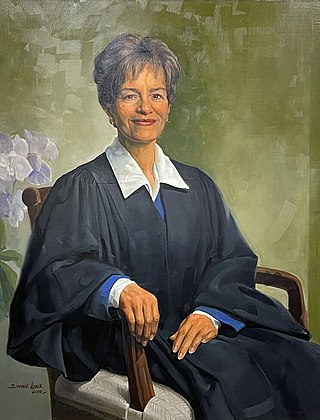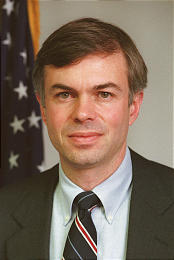
The Eleventh Amendment is an amendment to the United States Constitution which was passed by Congress on March 4, 1794, and ratified by the states on February 7, 1795. The Eleventh Amendment restricts the ability of individuals to bring suit against states of which they are not citizens in federal court.

The Child Online Protection Act (COPA) was a law in the United States of America, passed in 1998 with the declared purpose of restricting access by minors to any material defined as harmful to such minors on the Internet. The law, however, never took effect, as three separate rounds of litigation led to a permanent injunction against the law in 2009.

Bernstein v. United States is a set of court cases brought by Daniel J. Bernstein challenging restrictions on the export of cryptography from the United States.
The Child Protection and Obscenity Enforcement Act of 1988, title VII, subtitle N of the Anti-Drug Abuse Act of 1988, Pub. L.Tooltip Public Law 100–690, 102 Stat. 4181, enacted November 18, 1988, H.R. 5210, is part of a United States Act of Congress which places stringent record-keeping requirements on the producers of actual, sexually explicit materials. The guidelines for enforcing these laws, part of the United States Code of Federal Regulations, require producers of sexually explicit material to obtain proof of age for every model they shoot, and retain those records. Federal inspectors may at any time launch inspections of these records and prosecute any infraction.

Judith Ann Wilson Rogers is a senior United States circuit judge of the United States Court of Appeals for the District of Columbia Circuit.

Diane Pamela Wood is an American attorney who serves as the director of the American Law Institute, a senior circuit judge of the United States Court of Appeals for the Seventh Circuit, and a senior lecturer at the University of Chicago Law School.
Washington v. Glucksberg, 521 U.S. 702 (1997), was a landmark decision of the U.S. Supreme Court, which unanimously held that a right to assisted suicide in the United States was not protected by the Due Process Clause.
The Center for Individual Rights (CIR) is a non-profit public interest law firm in the United States. Based in Washington, D.C., the firm is "dedicated to the defense of individual liberties against the increasingly aggressive and unchecked authority of federal and state governments". The Center is officially nonpartisan. Its work focuses on enforcement of constitutional limits on state and federal power, primarily through litigation.
Dennis Jacobs is a senior United States circuit judge of the United States Court of Appeals for the Second Circuit.

David Brookman "Brooks" Smith is a senior judge of the United States Court of Appeals for the Third Circuit. He was previously Chief Judge of both the United States Court of Appeals for the Third Circuit and the United States District Court for the Western District of Pennsylvania, and is the only judge in the history of the Third Circuit to have served as both a chief district judge and chief of the Court of Appeals.

Thomas Lee Ambro is a Senior United States circuit judge of the United States Court of Appeals for the Third Circuit.

Scott Milne Matheson Jr. is a United States circuit judge of the United States Court of Appeals for the Tenth Circuit. He has served on that court since 2010.

Jerry Edwin Smith is an American attorney and jurist serving as a United States circuit judge of the United States Court of Appeals for the Fifth Circuit.
Debarment is the state of being excluded from enjoying certain possessions, rights, privileges, or practices and the act of prevention by legal means. For example, companies can be debarred from contracts due to allegations of fraud, mismanagement, and similar improprieties. Firms, individuals, and non-governmental organizations can be debarred.

Janice Rogers Brown is an American jurist. She served as a United States circuit judge of the United States Court of Appeals for the District of Columbia Circuit from 2005 to 2017 and before that, Associate Justice of the California Supreme Court from 1996 to 2005. She is a member of the Federalist Society and frequently features at events hosted by the organization.

Thomas Beall Griffith is an American lawyer and jurist who served as a U.S. circuit judge of the United States Court of Appeals for the District of Columbia Circuit from 2005 to 2020. Currently, he is a lecturer on law at Harvard Law School, a fellow at the Wheatley Institute at Brigham Young University (BYU), and special counsel in the Washington, D.C. office of the law firm of Hunton Andrews Kurth.
Salazar v. Buono, 559 U.S. 700 (2010), was a decision by the Supreme Court of the United States regarding the establishment clause of the First Amendment to the United States Constitution. The case concerned the legality of the Mojave Memorial Cross, a Latin cross which was placed atop a prominent rock outcropping by the Veterans of Foreign Wars foundation in 1934 to honor war dead. The location is known as "Sunrise Rock" in the Mojave National Preserve in San Bernardino County in southeastern California. The Supreme Court ruled that the cross may stay, but also sent the case back to a lower court, making the issue currently unresolved.

Robert L. "Bob" Corn-Revere is an American First Amendment lawyer. Corn-Revere is the Chief Counsel at the Foundation for Individual Rights and Expression and was formerly a partner at Davis Wright Tremaine LLP in Washington, D.C. He is regularly listed as a leading First Amendment and media law practitioner by The Best Lawyers in America (Woodward/White), SuperLawyers Washington, D.C., and by Chambers USA . Best Lawyers in America named him as Washington, D.C.’s 2017 “Lawyer of the Year” in the areas of First Amendment Law and Litigation – First Amendment. He was again named as Best Lawyers’ “Lawyer of the Year” for First Amendment Law for 2019 and 2021, and in Media Law for 2022.
Los Angeles v. Patel, 576 U.S. 409 (2015), was a United States Supreme Court case in which the Court held that a Los Angeles law, Municipal Code § 41.49, requiring hotel operators to retain records about guests for a ninety-day period is facially unconstitutional under the Fourth Amendment to the United States Constitution because it does not allow for pre-compliance review.
In United States law, a nationwide injunction is injunctive relief in which a court binds the federal government even in its relations with nonparties. In their prototypical form, nationwide injunctions are used to restrict the federal government from enforcing a statute or regulation.












